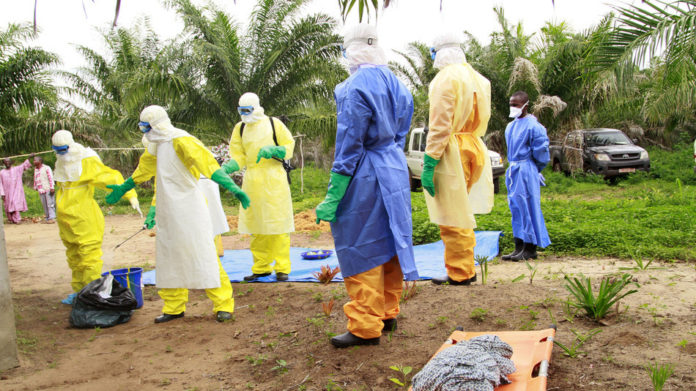As Ebola stubbornly hangs on in Guinea, cases pop up in Sierra Leone

CONAKRY, Guinea — Despite hopes that the deadly Ebola outbreak could soon be contained in West Africa, it shows no signs of abating in Guinea and may be flaring up once more in Sierra Leone as people are flouting rules limiting travel meant to stop it.
The election in Guinea in October adds a new layer of worry for Guineans and health workers, with some residents saying that campaign events, in which people crowd together, shouldn’t be held yet.
The deadly virus, which has killed more than 11,100 people mostly in West Africa in its worst outbreak ever, has been stamped out in neighboring Liberia, but is hanging on stubbornly in Guinea, where the Ebola outbreak was first reported in March 2014. Impending presidential elections could make it even worse.
“Ebola is on the rise again because of population movements. People move from one place to another,” said Dr. Amadou Talibe, an Ebola response team worker in Dubreka, 30 kilometers (19 miles) north of capital, Conakry. “People who have come into contact with Ebola but have not been identified, they go to another village and only then develop the symptoms of Ebola and then contaminate others.”
In Dubreka, a burial team put on protective equipment and sprayed themselves before entering a facility to collect the body of a baby, not even 20 hours old. They left with the newborn, wrapped and on a stretcher, for safe burial.
The virus, which is transmitted through direct contact with the bodily fluids of someone showing Ebola symptoms, has killed more than 2,400 people in Guinea, officials estimate. New cases keep cropping up because some communities refuse to follow safe burial practices, among other reasons.
Intense efforts are being made to identify the chain of transmission for the most recent cases, with checkpoints on roads and tracking down those infected. Some people are nervous about election campaigning.
“You have a lot of people gathering here. We are at risk of Ebola, yet we are gathering here. There are no preventative measures for us,” said Abubacar Sylla at a campaign event in Conakry last week for President Alpha Conde.
Ebola also returned to Sierra Leone’s capital, Freetown, last week after being absent for 18 consecutive days, officials there said. A fourth case was confirmed in government figures released Wednesday.
The first new case popped up in Freetown after a young man sick with the disease in another part of Sierra Leone ran away from a quarantine area and came to Freetown, said Patrick Fatoma, a spokesman for the National Ebola Response Center.
“Infected people are still running away from quarantine areas with the consequences of infecting other people. Right now we have 12 suspected high risk people on the run from the (Northern) Port Loko District,” he said
Fatoma said health workers are mobilizing and engaging the local community so they are more aware of bad practices, providing support to quarantined homes and enforcing curfews in hotspots.
“If people do not change their attitude, there are bound to be more Ebola cases,” he said.
Have something to add to this story? Share it in the comments.
